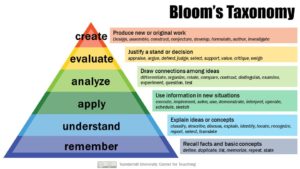You may think you have memories, but if you are not careful, memories may have you in the end. Understanding is important, but it in no way replaces memorization, esp when it comes to memorization for MCAT. In fact, according to Bloom’s taxonomy, a pyramid for learning that mirrors Maslow’s Hierarchy of Needs, Memorization precedes Understanding because the former is simpler and more concrete than the latter (Krathwohl, 2002).

Have you ever read an exam question about a certain topic that you are absolutely sure you have read about, and maybe you even remember that you have read it on the bottom left corner of a page, but you cannot recall at all what the text said?
Isn’t it so frustrating to know that you could have answered that question and received full marks if you had just memorized the content instead of merely understanding it as you read past? Maybe missing one question is not the end of your academic career, but you know very well the difference between having answered a question confidently versus beating around the bush hoping you had written the right keywords.
It bugs you and makes you worried and second-guess yourself, the uncertainty. The same uncertainty may also cloud your thinking and diminish your confidence for the next few questions, esp when they also rely heavily on memory.
Hence, reason #1 for memorization for MCAT: MCAT already creates so many uncertainties, it is best not to let memories be one because it is one of the easiest variables to control, and you have the power to do it.
“But my other teachers told me that you just need to understand materials to do the MCAT, you don’t need to memorize. So why are you telling me differently?”
If anyone just wants to do the MCAT, understanding alone would probably suffice. If one wishes to do super well on the MCAT, memorization and understanding are both required. The difference between working for one’s own MCAT initiative versus working for a company that one does not own is that one earns bonuses and raises by acquiring ‘excellent’ student reviews in the latter, which may be subjective and independent of how skilled the teacher actually is. The teacher who spends more time telling jokes may very well earn more positive reviews than a teacher who spends more time on challenging questions because the former is perceived as ‘fun’ while the latter is ‘just too serious’.
When a student asks if they should memorize, what answer do you think they were hoping to hear? Chances are they had not done much hardcore memorization for MCAT and were hoping that the teacher would confirm their course of action.
Now, what do you hypothesize a teacher with meager wage would answer in order to earn more bonuses and hopefully keep their job? The path of least resistance, telling the student what they want to hear rather than what they should hear. Furthermore, since many other teachers would corroborate their ‘advice’, it may not even be considered monstrous.
I am never a fan of sugar coating any constructive criticisms or suggestions, because it is a teacher’s fiduciary responsibility to help students improve, not to let them mellow in the beauty of mediocrity. Hence, motivation #1 for memorization for MCAT: remember the definition of discipline – doing something you don’t want to achieve something you desire. When you are in med school or become an MD, you will have to memorize far more new content than you did for the MCAT. Hence, motivation #2 for memorization for MCAT: think of it as a challenge or preparation for your bright future as an MD, not as a chore.
“But how much advantage will that actually offer me vs. just understanding it alone?”
Reason/advantage for memorization for MCAT #2: you need to memorize chemistry formulas, orgo reactions, physics equations, biochemistry pathways, human physiology, etc to answer questions.
Besides the obvious, the occult but deviously important reason is time. Hence, reason/advantage for memorization for MCAT #3: memorization saves you time on the MCAT that you can dedicate to more cognitively demanding tasks.
The MCAT is a timed test, in which you may only have 1 min/question. So what do you think is the most efficient way of spending that 60 sec?
- Spend 30 s trying to retrieve information from your memory storage, unsure if it’s actually accurate because it has taken you so long to recall it. Then frantically trying to apply that memory to the question, manipulate the numbers, analyze the answer choices, etc in the last 30 s.
- Immediately recall the information in <5 s, and spend the 55 s on manipulating the information, applying it to solve the problem, verifying it with the passage, checking all the answers, and confidently select the most correct choice.
In the words of Sherlock Holmes, the answer is transparent. However, this is not to say that memorization for MCAT is MORE important than understanding, or understanding without memorization is completely useless. If the task was to write a critique of a certain research article, a deep understanding of the research and its background is crucial. However, for the purpose of succeeding on the MCAT, understanding undoubtedly aids memory, but it cannot act without memory.
Krathwohl, D. R. (2002). A revision of Bloom’s taxonomy: An overview. Theory into practice, 41(4), 212-218.

